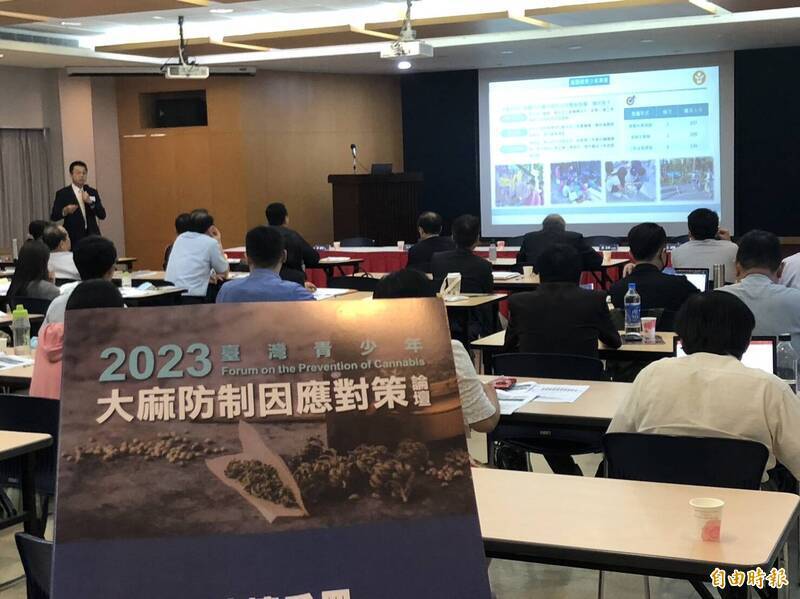Cannabis use among students is on the rise and it has become the second-most used illicit drug after ketamine, experts yesterday told a forum on cannabis use among young people.
The Ministry of Education hosted the Forum on the Prevention of Cannabis, which was attended by officials, representatives of civil groups and academics.
Young Taiwanese see calls around the world for the legalization of cannabis-related material, leading them to “ignore the addictive and harmful nature of cannabis,” the groups said in a news release.

Photo: Lin Hsiao-yun, Taipei Times
In 2021, marijuana was the fifth-most used illicit drug among students, with 7.71 percent of those who reported drug use listing cannabis, Department of Student Affairs and Special Education Director-General Chang Hui-wen (張惠雯) said.
However, in the first four months of this year, it had risen to No. 2 at 14.29 percent, just behind ketamine, Chang said.
Thailand has legalized cannabis, making it more accessible for people traveling there, she said.
The increase might also be due to more instances of public figures being seen smoking marijuana, as well as the availability of articles online advocating for legalization, she said.
As students begin summer vacation, the ministry is disseminating educational material to inform them and their parents about cannabis use, it said.
After the academic year begins, institutes would also conduct random testing, the ministry said.
Cannabis only remains in the body for a short time and there are products that speed up metabolism, which makes reducing availability of the drug even more important, Chang said.
Legalizing narcotics to mitigate their harm is a “historical mistake,” National Chung Cheng University professor of criminology Yang Shu-lung (楊士隆) said.
Authorities should wait for more definitive research and study how situations similar to those in other countries might play out in Taiwan to avoid the risks of hasty legalization, Yang said.
About 90 percent of Taiwanese do not support legalizing cannabis, Chang Gung University of Science and Technology associate professor of nursing Chao Kuo-yu (趙國玉) said, citing a study by the Taiwan Common Good Promotion Association.
The government should improve its guidance of public attitudes toward cannabis, clarify medical facts and “reveal the true state of cannabis use abroad,” Chao added.

The German city of Hamburg on Oct. 14 named a bridge “Kaohsiung-Brucke” after the Taiwanese city of Kaohsiung. The footbridge, formerly known as F566, is to the east of the Speicherstadt, the world’s largest warehouse district, and connects the Dar-es-Salaam-Platz to the Brooktorpromenade near the Port of Hamburg on the Elbe River. Timo Fischer, a Free Democratic Party member of the Hamburg-Mitte District Assembly, in May last year proposed the name change with support from members of the Social Democratic Party and the Christian Democratic Union. Kaohsiung and Hamburg in 1999 inked a sister city agreement, but despite more than a quarter-century of

Taiwanese officials are courting podcasters and influencers aligned with US President Donald Trump as they grow more worried the US leader could undermine Taiwanese interests in talks with China, people familiar with the matter said. Trump has said Taiwan would likely be on the agenda when he is expected to meet Chinese President Xi Jinping (習近平) next week in a bid to resolve persistent trade tensions. China has asked the White House to officially declare it “opposes” Taiwanese independence, Bloomberg reported last month, a concession that would mark a major diplomatic win for Beijing. President William Lai (賴清德) and his top officials

The Ministry of Foreign Affairs (MOFA) yesterday expressed “grave concerns” after Singaporean Prime Minister Lawrence Wong (黃循財) reiterated the city-state’s opposition to “Taiwanese independence” during a meeting with Chinese Premier Li Qiang (李強). In Singapore on Saturday, Wong and Li discussed cross-strait developments, the Singaporean Ministry of Foreign Affairs said in a statement. “Prime Minister Wong reiterated that Singapore has a clear and consistent ‘one China’ policy and is opposed to Taiwan independence,” it said. MOFA responded that it is an objective fact and a common understanding shared by many that the Republic of China (ROC) is an independent, sovereign nation, with world-leading

‘ONE CHINA’: A statement that Berlin decides its own China policy did not seem to sit well with Beijing, which offered only one meeting with the German official German Minister for Foreign Affairs Johann Wadephul’s trip to China has been canceled, a spokesperson for his ministry said yesterday, amid rising tensions between the two nations, including over Taiwan. Wadephul had planned to address Chinese curbs on rare earths during his visit, but his comments about Berlin deciding on the “design” of its “one China” policy ahead of the trip appear to have rankled China. Asked about Wadephul’s comments, Chinese Ministry of Foreign Affairs spokesman Guo Jiakun (郭嘉昆) said the “one China principle” has “no room for any self-definition.” In the interview published on Thursday, Wadephul said he would urge China to